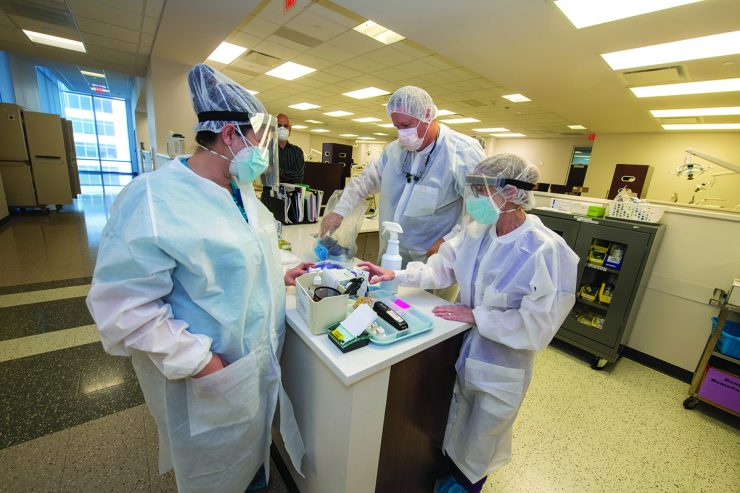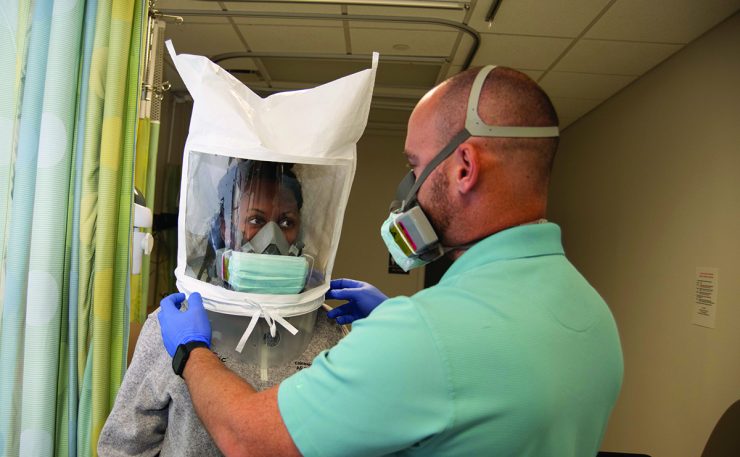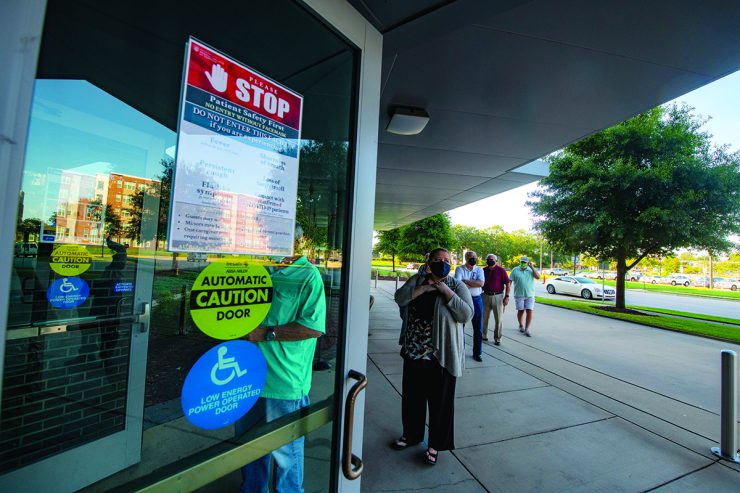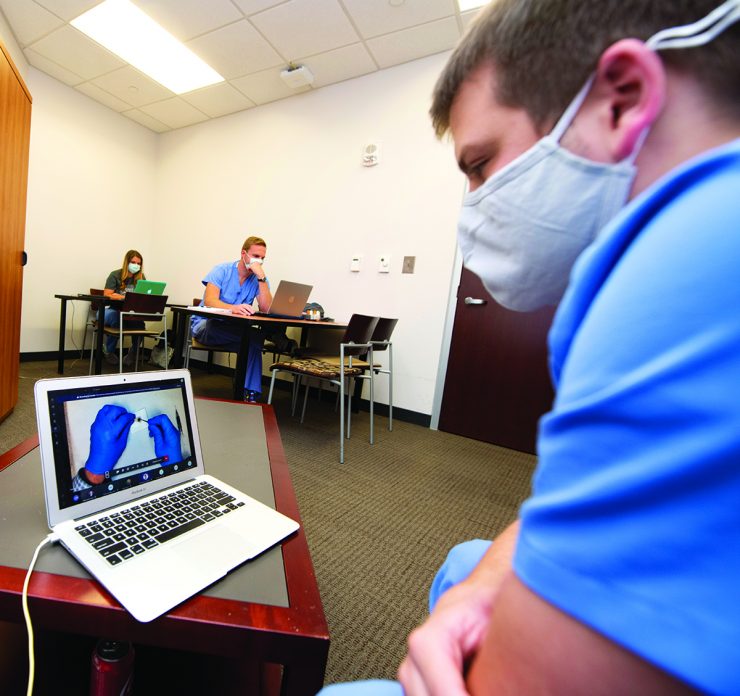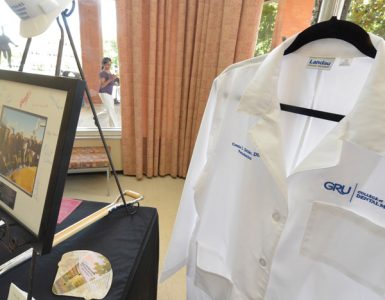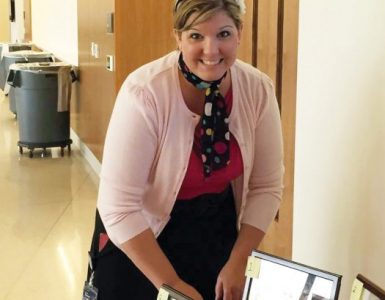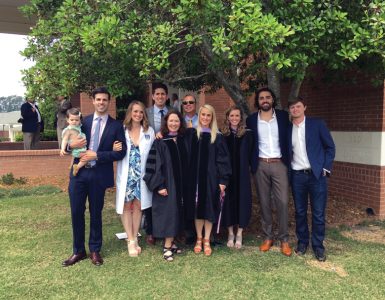Almost all aspects of DCG operations have been affected by the COVID-19 pandemic, but Dean Carol A. Lefebvre has a very simple take-home message: “We’ll get through it. And we’ll get through it together.”
Even before the virus prompted a nationwide shut-down last March, Lefebvre and her colleagues were already hard at work planning their next steps as the pandemic required a wholesale rethinking of practices and protocols.
“We greatly expanded our decision-making team, making sure every voice was heard and every challenge was addressed,” Lefebvre says.
Their top priority was the safety and well-being of each member of the DCG community. Several months out, these efforts have clearly been an overwhelming success. As of press time, the number of students and employees who tested positive for COVID-19 remains low for Augusta University and the DCG. The DCG exposures were traced to areas outside of the college’s domain.
“One case is too many, but our infection rate is considerably lower than that of the general community,” Lefebvre says. “We are very proud that the steps we took proved so effective.”
Those steps largely involved social distancing, with the vast majority of students, faculty and staff either learning or working from home for several months.
Yet nothing about the DCG mission could come to a standstill. Students and residents still had coursework and clinical training to complete. Fortunately, senior dental students completed their licensing exams prior to the pandemic. Faculty and staff recruitment was ongoing. New student, resident and faculty applications had to be vetted. Patients’ oral health issues persisted. Research needed to continue with minimal interruption. Administrative compliance and academic accreditation requirements still had to be met. Countless other considerations had to be factored in as well. The challenges were daunting, to say the least.
“We have never worked so hard,” Lefebvre says of her leadership team. “The days were very long — easily 12 hours long, plus evenings and weekends. But everyone has risen to the challenge.”
Not only did old rule books have to be thrown out, or at least shelved, but new ones had to be written on the fly.
“I’m all about data; that’s how my decisions are generally informed, and I like to have time to reflect and evaluate information,” Lefebvre says. “But when the pandemic hit, we didn’t have much data and we certainly didn’t have any time. We just had to make the best decisions we could based on what we knew at the moment. We couldn’t be paralyzed by analysis into not making decisions.”
Seldom before in the DCG’s history has teamwork been so essential. “I don’t make decisions in a vacuum,” Lefebvre says. “I’ve had frequent virtual meetings with associate deans, department chairs, program directors, students, alumni and others. We’ve benefited from many different viewpoints and perspectives, but the starting point was that we had to be flexible and willing to change.”
She has also had vital input from external experts, including , an infectious and chronic disease prevention specialist and dentist who retired from the the Centers for Disease Control and Prevention after 29 years and serves as a consultant. Also, Drs. Jose Vazquez and Rodger MacArthur in the Medical College of Georgia Section of Infectious Disease offered invaluable consultation. Vazquez, section chief, held multiple sessions with the DCG faculty to address concerns and answer questions.
“We have benefited from a wealth of wisdom, expertise and experience from many different sectors of the health care community,” Lefebvre says.
She and her DCG team tapped into it immediately.
Their challenges generally fell under several broad categories:
Education
When the Augusta University campus shut down in mid-March, the education of dental students and residents had to be vastly reconceived.
Within a week of the shutdown, the DCG had implemented online learning for its dental students. “We pushed through as much of the didactic coursework as soon as possible, knowing that when we re-opened clinically, it would be full steam ahead,” says Lefebvre, noting that
Dr. Joseph Vitolo, Associate Dean for Academic Affairs and Advanced Education, oversaw the curricular changes.
Fortuitous timing also worked in the college’s favor.
“The vast majority of our Class of 2020 graduated on time because they had taken their licensing exams before the pandemic hit,” Lefebvre says. “This was not true of many other dental colleges in the country; the timing varies from school to school, and in our case, the timing worked to our benefit.”
A plan was also put in place for completing the remaining clinical expectations for graduating dental students and residents, with Lefebvre and her team working with representatives of the Commission on Dental Accreditation (CODA) to ensure compliance with accreditation standards. A CODA response team was formed representing dental school deans nationwide as a unified voice to advocate on students’ behalf. (Information and updates are available at ada.org and adea.org.) The DCG also offered free online continuing education courses for alumni and volunteer faculty.
Lefebvre and the DCG faculty concede that dental education doesn’t necessarily translate seamlessly to the virtual world.
Says Dr. Jacqueline Delash, an instructor in the Department of Restorative Sciences, “It was a challenge to restructure a curriculum that is so hands-on and skills-oriented. But it’s doable, and it helps to remember that we’re not in this alone. The pandemic affects the entire world. Until we can get to a safe place, we do what we can. If you’ve done things the right way and feel you can sleep at night, you’ve done your job.”
Once dental students began filing back onto campus in May, they worked in simulation labs to practice psychomotor skills. “Most of the clinical coursework for our freshmen and sophomores involves simulation anyway, so their experiences have been close to normal,” Lefebvre says.
By late summer, actual patient care was back in the mix — but with extensive adaptations.
Clinical Care
Under normal circumstances, DCG faculty, residents and dental students treat hundreds of patients a week, providing both general dentistry (cleanings, sealants, fillings, etc.) and treatment in several specialty disciplines, including oral and maxillofacial surgery, orthodontics, pediatric dentistry, periodontics, endodontics, prosthodontics and more.
Lefebvre and her team, overseen by Dr. Alan Furness, Assistant Dean of Patient Services, instituted a four-phased approach to this facet of operations. Phase one ceased all treatment other than emergent care, with a hotline established as a resource for patients. “We developed an early-response screening process so we could manage dental patients with emergencies in our building rather than have them take up space in the [Augusta Health] emergency department,” says Lefebvre.
Phase-one patients, those with trauma or severe pain, could be seen right away in the dental school, while those with less pressing needs were carefully monitored via phone and/or online consultation.
The DCG also found ways to innovate. For instance, the Department of Oral and Maxillofacial Surgery mobilized a multidisciplinary team of DCG residents to use 3-D printing technology to print the swabs used by AU Health for COVID-19 testing. The 70,000 swabs produced were ultimately used throughout Georgia to augment testing efforts.
Phase two of the clinical response added treatment for urgent as well as emergent cases. This encompassed patients with significant needs — lost restorations and crowns and broken teeth, for instance — that posed the risk of complications if left untreated for long.
Says Dr. Kent Knoernschild, chairman of the Department of Restorative Sciences, “The faculty and residents in my department generally have patients with ongoing needs. Restorative dentistry involves issues that can lead to greater problems down the road if left untreated. Managing these issues required great coordination.”
Knoernschild notes that, to a person, everyone gave 100 percent. — and continues to do so. “Everyone involved has had the motivation to do what’s right,” he says. “There was never a single complaint. We had weekly meetings and stayed highly structured, making sure that everyone’s needs were met, and we continue to do that.”
In August, the DCG moved into phase three — resuming limited elective care in the faculty practice and residency program and focusing on non-aerosol-generating procedures — and later that month phase four was underway: bringing predoctoral students back into clinics for the patient-care portion of their education.
But the facilities they phased back into were vastly different than the ones they had left behind in March.
Facilities
The DCG Building and many administrative and clinical protocols were noticeably changed in a very short span of time.
“Dentistry has been one of the most greatly affected professions because of the aerosols we generate during treatment,” Lefebvre says. “This was particularly challenging for us because we have large, open clinics with as many as a hundred dental chairs on a single floor.”
AU President Brooks Keel and his leadership team moved quickly in response to these unique circumstances, helping the college install an air-purifying system and thermal sensors at entrances to monitor mask-wearing and take temperatures of everyone entering the DCG Building.
Says Lefebvre, “We have a substantial amount of traffic in and out of the building — 400 students, 250 staff members and 100 faculty, along with patients and other visitors. If someone enters with a fever, we can quickly move them to a secure area where they can be further assessed.”
Also, “just as we have to socially distance, we also have to clinically distance,” she added, noting that every other operatory is used for patient care, with the ones in between reserved for donning and doffing PPE. And students now work in teams as co-providers.
“We’ve tried to minimize aerosols moving around the building,” Lefebvre says.
Research
Of course, the Holy Grail of all COVID-19 initiatives is a cure, preventive vaccine or both. The DCG community has made impressive progress in this area.
For instance, Dr. Babak Baban, DCG associate dean for research and professor of oral biology and diagnostic sciences, worked with Dr. Jack Yu, chief of pediatric plastic surgery and the Milford B. Hatcher Professor of Surgery at MCG, to study an an active ingredient derived from marijuana that could help treat the sickest COVID-19 patients.
The study, published in Cannabis and Cannabinoid Research, found that cannabidiol, or CBD, has anti-inflammatory effects that could prove useful in treating a late-stage COVID complication called acute respiratory distress syndrome. The condition often results from the immune system’s overreaction to the infection, a “cytokine storm” that potentially impedes respiratory function by fighting the infection from within the lungs.
“When infection starts, we need the immune system to clear the virus,” says Baban. “In the second part, we need to down-regulate it, not stop it but bring down the power of the inflammatory response.”
In Georgia, only the Centers for Disease Control and Prevention and Georgia State University have labs with high enough safety ratings to work with the virus. That’s why Baban and his colleagues created a synthetic form that mimics a double-stranded RNA virus.
Working in mice, they were able to recreate the severe lung condition induced by COVID infections, then treat the mice with CBD. It improved lung function, blocked some dangerous clotting and seemed to directly block a factor that promotes inflammation. Says Baban, “It is a very practical, feasible and safe model. This would provide a very good model to work on the mechanistic issues” of the lung disease.
CBD is already approved to treat pediatric seizures “and its safety profile is well-established,” says Yu.
The Big Picture
As intense as the past few months have been, Lefebvre notes that lessons learned will carry well into the future.
“We’ve learned to be flexible,” she says. “That is the hallmark of this virus.”
And indeed, the virus is proving to be a moving target. “We don’t have all the answers,” Lefebvre says. “All we can do is be as transparent as possible. We try to communicate as fast as we can and make sure everybody gets the same information at the same time. The information changes so fast that communication is challenging.”
She anticipates ongoing modifications throughout the school year, and perhaps beyond, to ensure everyone’s safety and well-being moving forward. For instance, “We’re interviewing potential dental students by virtual methods for the first time ever,” she says. “We’re creating more and more videos and web content to familiarize candidates with the campus. And we’ve had to cancel, modify or delay certain events. That’s been one of the toughest adaptations: not being able to get together for various gatherings and activities. We miss the opportunities to celebrate the accomplishments of our students, residents, faculty and staff in person. But we’re still finding ways to connect.”
Delash concurs. “COVID has strangely helped us focus on what really matters,” she says. “I think we’re less inclined to take things for granted. Maybe the meaning of life is to do good and enjoy where you are in the moment.”
Says Knoernschild, “Everything we’ve done has moved us forward in a way that supports our students, patients and community. We all have to manage things in a positive way. The dental college is very good at identifying problems, creating solutions and having people around who are able to make it happen.”
Lefebvre considers this the DCG’s most precious asset. “Everybody has been more than willing to do their part, and many have gone far above and beyond their responsibilities to stand in the gap for those we serve. We have created a new normal. I am extremely grateful for our DCG family.”

